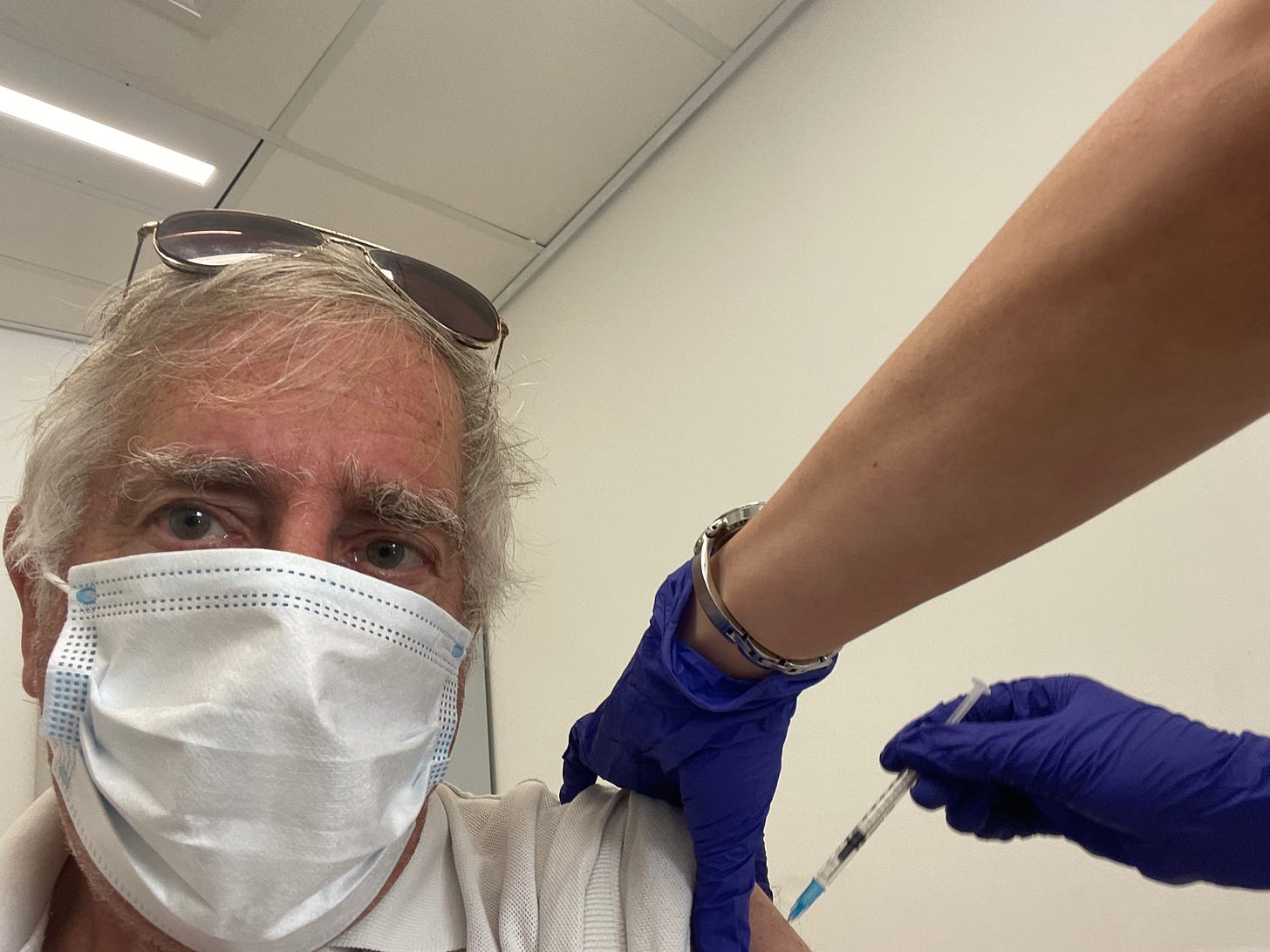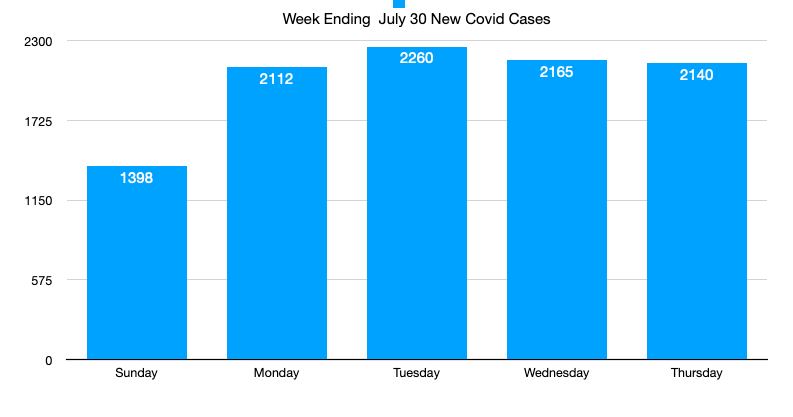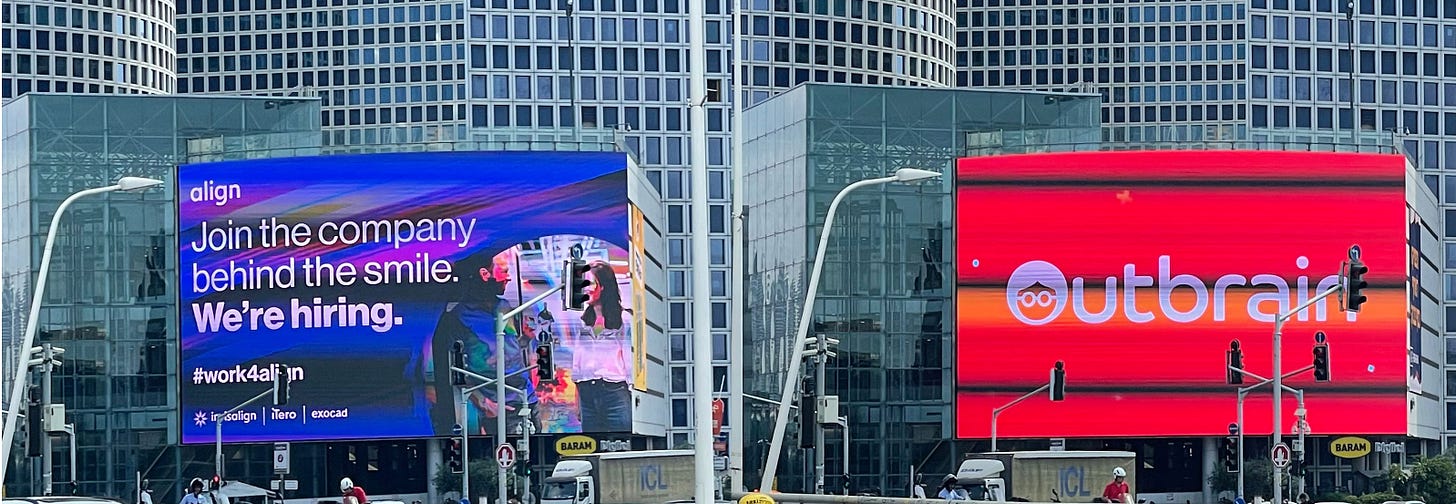COVID-19
I want to start off with some personal news. This morning, I received a third dose of the Pfizer vaccine. I was one of the first people to get my initial dose in December.
Last night, the Israeli government announced their approval to administer the third shot to anyone over age 60, who had received the second dose five or more months ago. The decision was prompted by the discovery that infection rates have gone up more quickly than predicted — and cause for even greater concern, the number of severely ill patients has increased much more rapidly than was anticipated. There were 2,140 new cases yesterday and 167 people are in critical condition in Israel’s hospitals.
Most of those sick have been vaccinated, but that is expected — with over 90% of those over 60 vaccinated. Thus, the vaccinated make up the largest pool of potential patients. Studies have now shown two interrelated facts: First, those who have been the sickest have shown to possess significantly lower antibody levels than those who did not fall ill. Second, there is an apparent decrease in COVID-19 antibody levels over time. As a result, Israel decided not to wait, but to authorize and encouraged anyone in the first cohort to receive a booster shot. It was a gutsy decision to go it alone, ahead of the FDA, but I believe it was the right decision.
Meanwhile, the government has been highly reluctant to take any additional actions to decrease infection rates. The numbers of new daily COVID infections are currently doubling every two weeks. Based on current projections, that upward swell is unlikely to change. Prime Minister Bennett has made clear that, for the moment, he has decided not to initiate restrictions that will limit business and social life. It's a risk. The hope is that the third dose of the vaccine will limit deaths and curb hospitalizations. This is quite a gamble.
The most serious disagreements within the coalition are between Education Minister Yifat Shasha-Biton and Health Minister Nitzan Horowitz. Shasha-Biton continues to push a plan for reopening the schools, practically as if the pandemic has already ended. MK Shasha-Biton dismisses a need for smaller class groupings and suggests that students exposed to COVID should be required to quarantine for just two days — An idea considered preposterous by medical professionals. The Education Minister also opposes administering vaccines in schools.
Shasha-Biton was a gadfly to the medical professional during her time as head of the COVID Committee of Knesset in its last session; so much so, that then Prime Minister Netanyahu removed most of the power from that committee. She was popular with the public, and so Gideon Sa'ar made her number 2 in his New Hope Party, and promised her she would be the Minister of Education. Sa’ar kept his promise, the children may pay for it.
BUDGET
The budget process is moving forward, and with it what is called “The Arrangements Bill”. The two go together, and unless passed, a new election is automatically called. First, here are the current challenges with the budget. The annual fight between the Ministry of Finance and the Defense Ministry was settled quietly at a meeting between Prime Minister Bennett, Defense Minister Gantz, and Finance Minister Lieberman. All current or former Defense Ministers agreed to the NIS 4 billion increase requested by the Ministry of Defense.
The biggest challenge may come from the Health Ministry which has been chronically underfunded for the past decade, and whose Minister is demanding a substantial increase. The Finance Ministry has proposed a significant cut in money given to support Yeshiva students. Bennett is said to be under pressure from the rabbis (who opposed him becoming Prime Minister) to block the cutback.
To put some of the budget issues into a bit of perspective, the current budget proposal includes the following:
Defense Minister …………… NIS 58 billion
Ministry of Education ……… NIS 66 billion
Ministry of Health ………….. NIS 43 billion
Transportation Projects …… NIS 37 billion
Debt Servicing ……………… NIS126 billion
The “Arrangements Bill,” similar to a reconciliation budge package, contains many reforms —primarily good, a few problematic. I think this process is wrong, as many of the items in the package deserve individual debate. Still, perhaps in the current system, in the current political environment, even good reforms are likely not to pass in a timely fashion.
Some of the significant sections of the Arrangements Bill include a major overhaul of the Kashrut system, allowing competition between various supervision authorities. This aspect of the bill has broad support, except among the ultra-Orthodox who will lose both power and patronage.
A provision in the bill that would open up Israel to agricultural imports has resulted in loud protests from farmers, claiming they cannot compete. The government has offered them compensation and maintains that allowing imports will save Israeli consumers significant sums of money. The fate of this reform is unclear. With the agricultural lobby raising the issues of both Zionist claims, i.e., what is Israel without growing on the land, and the importance of food security, in an uncertain time. I could devote a whole newsletter to this topic.
ELECTRIC CARS
The joint statement by the Transportation, Environment, and Energy Ministries that car importers would be required to sell a high percentage of electric cars by later in the decade, has been redirected by the Ministry of Finance into the creation of a Committee. The car importers are some of the wealthiest people in Israel, and they oppose this measure. Draw your own conclusions. The proposal that the government only purchase electric cars has also disappeared, for the moment. What remains is a plan to only buy electric buses, in the future.
BEN & JERRY’S AND THE OCCUPATION
The Ben & Jerry’s controversy continues to swirl around the Jewish world, and to a lesser extent in Israel. Support of the boycott by Ben and Jerry's founders has received a lot of attention. They made it clear that they support Israel but oppose the occupation. This past week, I ran into a small demonstration against the occupation, in Tel Aviv. I asked one of the demonstrators, approximately my age, my usual question — How do we end the occupation while ensuring that the West Bank does not become Gaza? His response was that we should have responded more forcefully to the first rocket fire from Gaza. In short, he did not have an answer. I suggest, anytime you run into someone who calls for “an end of the occupation,” ask them that question. Unfortunately, there is no good answer.
Israel’s new government has begun to make some progress toward improving the day-to-day lives of the Palestinians. Approval has been given to allow an additional 15,000 workers to enter Israel to work, each day. In addition, Minister of Health Horowitz and Minister of Environment Tamar Zandberg met with their Palestinian counterparts. This was the first meeting of its kind in almost a decade. A great deal can be done on the ground to improve the lives of the Palestinians and strengthen the Palestinian Authority. If we have any chance of peace in the future, these steps need to be taken.
DEFENSE
There were reports this past week that the Russians intercepted incoming Israeli missiles, in an attack on Syria. This caused a great deal of speculation that Russia might be changing the rules of the game in Syria. However, I doubt it. Russian intervention here was probably more related to the arms expo taking place in Russia at the moment. It's not clear to me that the Russians have the technology needed to down an incoming missile fired from a plane that is a stretch. Of course, they have the tech to down the plane.
An Israeli-owned ship was attacked off the coast of Oman. Two sailors and British and Romanian were killed.
ECONOMY
Given almost no new limitations the Israeli economy has fully recovered from the period of Covid restrictions, with Israeli domestic spending up substantially. Since 50% of government revenue comes from consumption taxes, this should help the government's budget challenges. The Bank of Israel currently estimates that the government deficit to GNP will stand at 7.1% in 2021, but fall back to the acceptable range of 3.8 in 2022. The debt ratio to GNP now stands at 74% and is expected to remain there for the following year.
In the meantime, various Israeli companies have placed competing ad campaigns in Tel Aviv, not to sell their products, but to sell themselves to the top software and engineering talent, which is getting harder and harder to find.
Riskified began trading on the Nasdaq, at a higher price than initially planned. The company raised $368 million and currently has a value of $3.3 billion.
Coralogix has raised $55 million, in a Series-C funding round. The company has a data platform for engineering teams.







